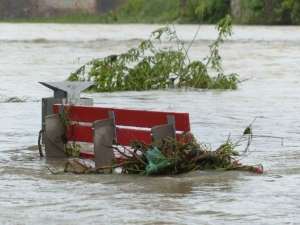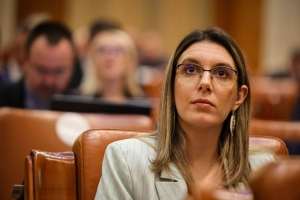Reporter: Why is replacing the software of the Central Depository important?
Cristian Agalopol: The latest financial crisis has proven that in the absence of an adequate risk management mechanism, all the financial innovations can lead to veritable disasters generated by the shockwave at a systemic level. For those who don't know, or for those who are newer to the market, the Central Depository is a private institution, of national interest, which is intended to maintain the balance of the financial market. Now, after the financial market, when all the international markets have fully or partially recouped their losses, their main concern is to develop business models that revolve around the infrastructures of the stock markets or around the financial markets. The main purpose is to minimize risk, to make operations more efficient, as well as reduce operating costs and increase the profitability of system operators or of participants on the stock market. Thus, the infrastructure of the financial markets has become, from my point of view, the main engine promoting the efficiency and competitiveness of the markets, in this international context, which Romania is a part of as well.
We must become aware that, if the Romanian stock market in Romania doesn't make significant changes at an infrastructure level, we run the risk of being marginalized on the map of institutional investors and on that of non-resident investors. If we look at countries around us, we will see that all the markets that we want to compare ourselves to, such as the Czech Republic, Hungary, sometimes Poland, have major projects for improving the infrastructure ongoing or already implemented.
The Czech Republic is working on the Central Counterparty, Hungary has selected "Tata Consulting" to join "Target 2- Securities" and to improve the software on the local market. Poland has conducted a selection of providers for the software of the Bucharest Stock Exchange and out of London Stock Exchange, Nasdaq OMX and NYSE Euronext, it has selected NYSE Euronext.
All of the countries around us have considered it necessary to improve the local infrastructure in order to respond to the market participants, as well as to ensure the alignment of the market standards and practices to the new European directives and regulations.
The only country in the region that doesn't have a project to improve its infrastructure, and which isn't concerned with that, unfortunately, is Romania. After 20 years, we are faced with a decision which is important from a strategic point of view, as well as in terms of the direction we want to follow. Through that decision, we will ensure a future or we will cast a shadow on the whole Romanian stock market.
Reporter: What would be the local needs?
Cristian Agalopol: Currently, there is a need for a new software, because the Central Depository operates multiple systems and data platforms which are managed by several entities. This whole tangled infrastructure are causing both the operating risk, as well as the volume of manual labor, to be excessively high at the Central Depository.
Most of the ratings firms that classify the stock markets have mentioned in their reports that one of the main risks which Romania has is the lack of segregation between the trading accounts and the settlement accounts.
There are also many participants in the market that want a substantial improvement of the mechanism for the lending/borrowing of securities, an improvement of the operations flow. From my point of view, we must ensure that the in the new infrastructure, the participants and the institutions of the stock market send each other instructions through channels that ensure both confidentiality and safety. We've seen what has happened in the Harinvest case, when the instructions were sent by fax. I've said it on other occasions as well - it is unacceptable that in the 21st century, the institutions of the stock market write letters to each other and exchange instructions with the participants by fax. We only have one settlement session per day, without optimization mechanisms, there are numerous settlement risks on the way between brokerages and custodians. There have been talks concerning these risks, all this chain between brokerages and custodians is full of complaints.
Another important thing that needs to be said and which I will certainly discuss in the first meeting of the Board of Directors of the Depository, is the fact that our market is required to switch to a "T+2" settlement cycle by January 1st, 2015. Romania is currently the only country in Europe that hasn't made a firm decision on the date when the stock market will switch from a "T+3" to "T+2" settlement cycle.
I would also like to mention some of the things that we have to do which are derived from our need to adapt to the European regulations, especially when it comes to the new regulation applicable to the Central Depository. In August 2015, the Central Depository will have to apply for a license again according to this regulation.
The European directives will certainly impact the future of the Romanian stock market and we need to be aware of the fact that if we don't have an infrastructure we can rely on, they will be extremely difficult to implement.
I also wish to issue a warning. The situation which has been created lately, concerning the confusion around the need to implement a software was caused by the lack of communication between the executives of the Bucharest Stock Exchange and those of the Central Depository.
Taking trips to London, New York or to other countries is useless as long as we don't do our job at home. I am asking the two executives of the Bucharest Stock Exchange and of the Central Depository to sit down at the same table, to talk, because they hold in their hands the future of the Romanian stock market and they will become responsible for their failure, if the market isn't led towards the level of growth that participants, brokers and custodians expect from it.
Reporter: Still, what is good for other countries may not be good for us. The players of the stock market should be aware of the economic benefits. How can the investment in a new software be justified, given the current size of our market, which has a daily turnover of just a few million Euros?
Cristian Agalopol: This brings us back to the manner in which the executives of the two institutions have talked to the market lately, in order to ensure that the market participants, brokers, custodians, brokers, issuers, the financial institutions understand the need for the implementation of that kind of software. Everything relies on communication. Dialogue is the basis of the fundamental positive changes in any modern society. I think that the Romanian stock market does not have the necessary maturity to make decisions based on an objective analysis. We still make decisions based on pride and personal ambitions, on an inappropriate attitude to the stock market participants - the ones who contribute to the revenues of the Bucharest Stock Exchange and of the Central Depository. I think that the executives of the two institutions have the obligation to talk to the market.
Going back to the question, from my point of view, it is a proof of superficiality to look at replacing the software of the Central Depository strictly from a financial and economic perspective. I am not saying that this aspect shouldn't be taken under consideration or that it is not important, but what I am saying is that, in our opinion, this is a strategic project, and that we should consider the fact that the Romanian capital market depends on this investment, as does the future of the participants and the manner in which the resident and non-resident investors will perceive this market in the future.
Reporter: You are saying that the manner of approaching such a strategic project from an economic point of view is superficial. Still, market participants have been hurt somewhat in the past few years and it is normal for them to think of their money first. Moreover, even the Bucharest Stock Exchange is asking questions concerning the cost-effectiveness of a new software, in a document posted on its website, in preparation for the General Shareholder Meeting. The BSE insists to find out what the economic reasons that justify changing the software.
Cristian Agalopol: I was a bit surprised at how the Bucharest Stock Exchange sees the reform of the capital market. I was surprised to find that we are still following the Romanian method of patching what we already have. I think that the number one threat to the development and evolution of the stock market in Romania is the thinking along he lines of "if it isn't broke, don't fix it". If it does work the way things currently are, then why change anything? I think that our great luck is the fact that we are small and that the trading volumes of the BSE and settled through the Central Depository aren't putting any pressure on the old infrastructure of the Romanian stock market. I think it is necessary to look at these investments from a strategic point of view. These are not investments that are easy to make, we need to realize that they require sacrifices from all of the stock market participants, including the BSE and the Central Depository, and that the future of our stock market depends on these reforms.
In understand the concern of the Bucharest Stock Exchange concerning the financial and economic aspects, but what concerns me even more is the future, for which we all have to make sacrifices. The Bucharest Stock Exchange and the Central Depository have to know that all these implementation costs which the Bucharest Stock Exchange mentions in the report will increase more and more as time goes by, and these reforms are delayed.
Reporter: Does an assessment of the impact this project will have on the budget of the Depository exist?
Cristian Agalopol: Yes, there is one and it has been sent to the executive of the Bucharest Stock Exchange. Once again, I am surprised to find, reading that document, that the executive of the Bucharest Stock Exchange mentions the fact that no such study currently exists. It does exist, and it can be proved that it was sent in due time and in a reasonable manner in to all the shareholders, and, implicitly, to the executive management of the BSE.
Reporter: You are accusing the BSE of forging official documents.
Cristian Agalopol: No. Far from me the idea of making such an accusation. What I can say is that the information's path was broken somewhere and that the Central Depository has made available to the shareholders all the information they have asked to facilitate their decision-making process.
Reporter: Can you give us a few elements of that impact assessment?
Cristian Agalopol: I would prefer not to talk about costs, because the Central Depository has concluded confidentiality agreements with all the providers that have expressed their intention to participate in our selection process. I can tell you in all confidence that the moment this process is completed, all of these costs for the market will be transparent.
Probably the main reason why some of the shareholders of the Bucharest Stock Exchange have decided to include on the agenda of the General Shareholder Meeting the issue of implementing the software is because they have considered this infrastructure change to be of strategic importance for the capital market. It is not a project of the Central Depository, it is a project of the stock market and I think that the level at which it needs to be approved is that of the General Shareholder Meeting of the BSE.
I want to make it clear that we are not trying to push any specific provider, even though it was our responsibility, of the Board of Directors of the Central Depository, to come up with a recommendation.
What interests us is for the shareholders of the Bucharest Stock Exchange to approve the need for changing the infrastructure of the Romanian capital market and to allow the Central Depository as a system operator to take responsibility for that project, which it would implement, through a consensus, together with the Bucharest Stock Exchange. The executive management and the Board of Directors of the Central Depository must take on the responsibility for this project. I find it abnormal to keep passing the buck on this issue.
Reporter: As far as you know, did the dialogue between the two executives intended to reach a consensus continue during this time, after the general Shareholder Meeting of the Central Depository, to reach a consensus?
Cristian Agalopol: There was some dialog, but from my point of view, it wasn't enough.
Reporter: What is missing?
Cristian Agalopol: First of all, a change in attitude. I think that the two executives need to set their pride aside and realize that together, through their decisions, they hold the future of the stock market in their hands.
Reporter: Can you tell us how those decisions concerning the joining of "Target 2-Securities" (T2S) were made at the Central Depository?
Cristian Agalopol: I want to make a clarification here: the joining of the pan-European T2S platform and the software of the Central Depository are two different projects.
The main reason why we have placed them together was because we wanted to have a more efficient process for the allocation of internal resources.
Going back to the manner in which the decision was made on Target 2-Securities, the Central Depository has received the favorable license from the CNVM, at the time, and then, as far as I know, approved this project in two meetings of the Board, and starting with 2007 or 2008, the Central Depository has systematically included in its business plan approved by the General Shareholder Meeting the accession to the Target 2 Securities European platform. I think that things have been clear from the very beginning, they were discussed with our partners in the market at the time - and here I am referring not only to the Stock Exchange, but also to the CNVM and the National Bank of Romania. Could things have been done better, could there have been better communication, yes, I think that there is always room for better communication. At this moment, the Central Depository has a commitment to European institutions. The failure to honor this commitment can affect Romania's credibility and the way it is perceived. It is not a commitment signed with just anybody, but with the European Central Bank, which was represented at the time, by Mr. Mario Draghi, with whom the Central Depository has signed this contract. From my point of view, it is risky not to honor this commitment. Had there been any doubts or questions, the market certainly would have reacted at the time and would have asked more questions to the Central Depository. They have considered that the information made available to them by the Central Depository was enough for making the decision.
Reporter: Were the two decisions of the Board of Directors made before or after the first commitments to join the T2S?
Cristian Agalopol: Before. The two decisions have predated the signing of the framework agreement for the accession. It was the only way it could go.
Reporter: In the documents posted by the BSE on the website for the General Shareholder Meeting, there is mention of operating losses at the Central Depository over the last three years.
Cristian Agalopol: I can tell you that the Central Depository has contributed significantly to the budget of the Bucharest Stock Exchange over the last three-four years.
As to the net profit of the Central Depository made between 2010 and 2012, it amounts to 9,428,653 lei. The operating result for the aforementioned period was positive, with the exception of one year.
Compared to the equity of the Central Depository, the combined yield per share for the 2010- 2012 period was 37.28%, whereas the contribution of the dividend paid by the Central Depository out of the net profit of the Bucharest Stock Exchange for the 2010- 2013 period was 28.71%.
Reporter: Adrian Simionescu said that in the General Shareholder Meeting of the Central Depository, Ludwik Sobolewski resorted to insults. Did you feel insulted by Mr. Ludwik Sobolewski or was this just the interpretation of some of the shareholders?
Cristian Agalopol: I was surprised both at the attitude of the legal representative of the majority shareholder in the General Shareholder Meeting of the Central Depository (ed. note: Ludwik Sobolewski), as well as the lack of respect, not towards me personally or towards my colleagues on the Board of Directors, even though I personally think that it is important to respect each other, but more the attitude towards the shareholders present in the room.
The manner in which the talks were conducted in the General Shareholder Meeting of the Central Depository makes me feel very concerned, more than ever, about the future of the Romanian stock market. I don't think I've never been more concerned in the last 20 years over the future of this market than I am now. I don't want to comment any more than that on how things went at the General Shareholder Meeting.
Reporter: Are you concerned only because of the attitude displayed by Mr. Sobolewski or also because of some of his actions?
Cristian Agalopol: I haven't seen his actions yet, but I have seen his attitude.
Reporter: Why aren't you running for the management of the Central Depository?
Cristian Agalopol: The fact that I have not been nominated on the lists of the BSE was construed to mean that I no longer have the support of the Bucharest Stock Exchange.
The truth is that, had I wanted to run for chairman, I would have certainly asked for a vote of confidence from the shareholders who initially nominated me for this position. But I am involved and I coordinate major capital market projects, in Romania as well as abroad, at my current job. I was recently elected on the Board of Directors of Amcham and I will probably coordinate the committee for the stock market and I will also be a part of the Coalition for Romania's Development on the capital market segment. I am a perfectionist and I like to see through and do well everything I do. I had to draw a line and to choose the projects I want to get involved in for the future. For the moment, I have decided to step aside from the Central Depository. I will carry out my term with professionalism and responsibility and I will remain close to the stock market, through all the actions I will coordinate and with all the projects I will be involved in in the future. Moreover, I will make sure that all these projects will bring a collective value at the capital market level, rather than an individual one, to an interest or a small faction of interests.
Reporter: What is your opinion on the voting through lists, proposed by the BSE for the management of the Depository and on the nominations for candidates - of whom some are incompatible at this moment.
Cristian Agalopol: No opinion. I think that the shareholders of the Bucharest Stock Exchange need to seriously decide on how they want this market to be managed from now on. I think that it is imperiously necessary for the criteria used to select the people that are in charge of making decisions to be objective rather than subjective.



























































